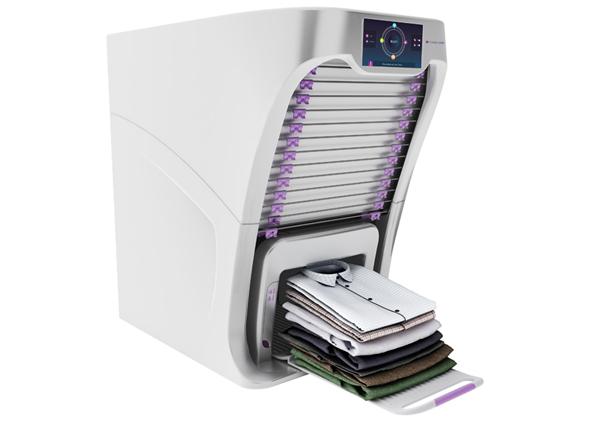There’s been a lot of buzz lately about a laundry-folding robot called the FoldiMate. More than 90,000 people have already registered (and paid $80) to be guaranteed a folding robo-helper when the machines go into preorder next year and ship in 2018. And in a poll of more than 2,000 people on theTelegraph, 83 percent have said they would buy a FoldiMate. What a time to be alive.
The appliance is about the size of a washer or dryer. You clip your pants, shirts, skirts, and other clothes onto the machine and it does professional folding, wrinkle-reducing steaming, and even perfuming. And it’s a robot. It sounds like a dream come true.
The reality, though, is that there are major drawbacks. First of all, the full price is expected to be between $700 and $850—numbers that sound more suited to a robot that’s also a washer or dryer, and maybe even makes coffee. To operate the FoldiMate, you have to clip each item of clothing onto it individually. It can only do 15-20 items at a time, and it can’t handle underwear, baby clothes, socks, plus-size clothes above XXL, or bed linens.
A FoldiMate spokesperson wrote in an email that the robot will fold “virtually anything that will fit inside of it.” And added that, “We have yet to find a fabric that FoldiMate cannot handle.” The company’s website says that the chance of the robot harming or ripping your clothes is less than one percent.
Given all the clipping, FoldiMate’s FAQ section includes the question “Isn’t it faster just to fold the clothes myself?” Very valid! The company’s answer is not exactly reassuring. “Even if you fold faster than clipping, folding a full load of laundry is akin to using a dishwasher over doing the dishes by hand. Plus, your clothes will be expertly folded every time.”
Couple things. First of all, this would be true except that the majority of the time you only need to load your dishwasher once (except maybe at Thanksgiving) versus having to load it 15-20 items at a time in the case of the FoldiMate. Unless it’s a small load of laundry, it’s going to take a lot of clipping to get everything folded. Also, in terms of environmental impact, running a full dishwasher saves resources versus hand-washing, whereas using the FoldiMate draws resources that you wouldn’t have used by just folding your frickin’ laundry yourself.
To be fair, automation is delightful, and putting less human energy into mindless household chores is a good thing in lots of ways. But there’s something more concerning about the FoldiMate. The robot is going to be Wi-Fi-enabled so that someday users can receive updates and notifications about things like the machine’s status, and stats like folding time. So now your laundry-folding robot, which is already of questionable usefulness, will also be vulnerable to cyberattacks. You just don’t want to be answering the question, “Oh, how did your smartphone get hacked?” with “Eh, some bug in the push notifications from my laundry robot.” That would be a sad day, indeed.
The FoldiMate definitely has its charms and taps into a lot of our hopes about a more luxurious future. But microwaves didn’t put an end to cooking just like Roombas didn’t eliminate the need for cleaning. If you really want to invest in folding technology, you might want to just buy a FlipFold (As Seen on TV!).
